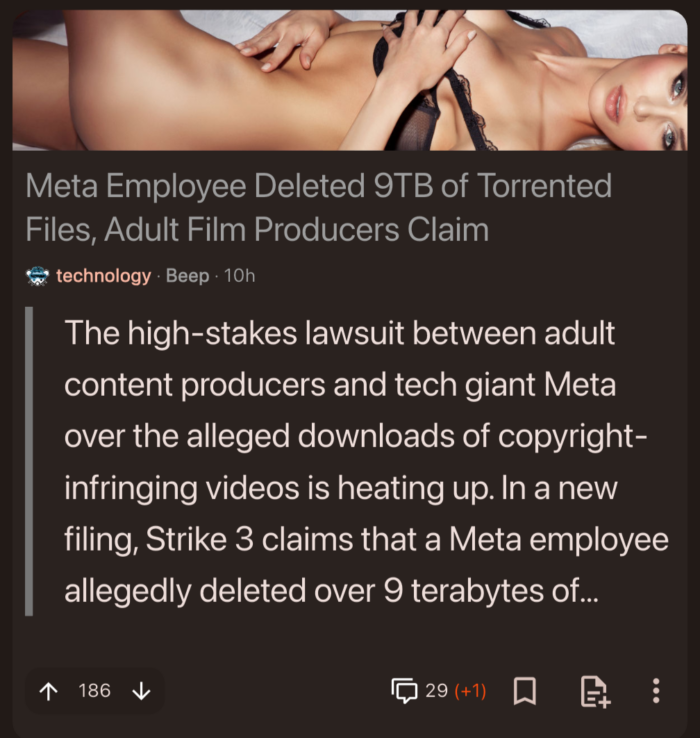

The thumbnail for the post is of a woman wearing only a bra laying seductively on a bed






How 'bout a NSFW tag there buddy.
EDIT: The thumbnail for this post is of a woman wearing only a bra laying seductively on a bed. I realize some users may not see this or have thumbnails active. But some do.


You had an argument until you brought up KOSA. That bill is absolutely brutal and had it passed, this administration would have yet another weapon to clamp down on free speech and terrorize citizens.


Notably, 10 of the 19 individuals who reported that they were pregnant when exposed reported a subsequent miscarriage — that’s about twice the expected rate of miscarriage.
Holdup, so the expected rate is 5 out of 19? That seems high but I have no data or experience in the topic.
Yup. Tuning seemed to be a right PITA.


Yeah. Right.
“If you get caught, call it a bug.” seems to happen a lot this administration.


No shit Sherlock. Were solid into this as normal now.
Remember when democrat related keywords were filtered January 2025? Yeah, “oopsies” said Meta.
You have any legal teeth of that accusation, Newsome? Otherwise it’s in the ignore bin with all the other grievances.


I wonder how they define “Public safety agencies” since other programs refer to “Justice and Public Safety agencies”. Is this difference an oversight or is something being excluded?


Annnnd TIME! About 1 hour.
95% interface and widgets swapped over to lawnchair!
Boom!


I used to use lawnchair. Good reason to switch back.


Yeah. Totally correct. That one slipped by.


Ahh sonofabitch! It’s already updated for me and there is no changelog. Turned off auto update.
Edit: and uninstalled. Lawnchair FTW.
Ehh?? How would that app know about the data the store potentially collects?
The app database and store database are separate, both containing duplicate data on the receipt or any affiliate data sharing that can facilitate de-anomyzation.
What? No one is doing that. Why would they? What if you have bluetooth disabled all the time like me because you don’t have any Bluetooth accessories, or to save power, or because Bluetooth is insecure.
A lot of retail -even my doctor office - do use this and have for a while.
BLE customer monitoring is certainly a thing. Here is an article from 2014: https://www.retail-innovation.com/carrefour-track-customer-journey-around-store-using-ble/
Here is a more modern ad-riddled writeup. https://www.encstore.com/blog/5162-a-step-by-step-guide-to-using-ble-beacons-in-retail
There is even a data broker claiming it records and updates your advertising profile before you get to the register. I wish I bookmarked that page when I read it years ago.
Disabling Bluetooth, I suspect, would stop tracking. Note some modern phones still respond to Bluetooth and tracking when powered off, such as the Pixel, unless Bluetooth is disabled before shutdown.
??? The camera is just to check on the customers if they are scanning everything properly and not stealing. A human is reviewing the footage.
Basic cameras can do that, but companies like Walmart and Home Depot have more advanced systems. Walmart profiles customers and can identify and alert staff/police to repeat problem customers. Home Depot has a class action case claiming it uses face detection technology. Heck, my cheap-ola off-the-shelf home security camera can track people and license plates straight out of the box. The Flock cameras tracking people and vehicles all over the cities use an OS released in 2017. This tech is prevalent now.
Many stores have installed Bluetooth beacon tracking that will monitor all customers cell phones (or other Bluetooth devices) precise location throughout the store.
The items on the receipt can work as a “checksum” for a specific pattern around that time of day.
Self checkouts also have cameras that can identify biometrics, repeat shoppers, and other data points for a profile. But it’s not known is the customer used one of those kiosks.
Smart move 👍
Congratulations, you’re in a new database.
I imagine it has a unique code (last digits of CC#) location and timestamp, and valuable purchase information advertisers are salivating over to profile you; and yes, I mean you, not your cousin. The only cash your cousin will see is just enough scraps to trigger feel-good responses so this can happen again.
Edit: if the receipt is indeed yours…


Oh no! A struggling utility! I wonder where excess money is flowing? What could possibly fund these upgrades? -[insert generalized doom & gloom] -
https://energyandpolicy.org/as-customers-struggled-utility-ceos-pay-spiked-last-year/


We had no intention of making/hosting a website with the trademark. The company was in agreement.
After we got it, the bossman comes to me and says “so we can make this email addresses now, right?”
Like, duuude… It’s not his expertise, I know, but he thought web pages and email was totally separate systems.
Anyway, that was almost 25 years ago. All water under the bridge.
Idk… I’m a tad excited to buy one for peanuts on eBay in a couple years for a local smart home upgrade. Heck, when the bubble pops, maybe they can sell power from all those generators back to the city and lower our utility bills too. /S